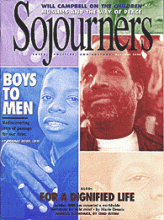With massive cuts to federal and local programs for poor people, the faith community is repeatedly named as the institution to fill the gaps in the shredded social safety net. Yet while there is an increased willingness by the religious community to do even more than it already does to help the poor, barriers are often placed in the way.
Like many cities in the United States, Washington, D.C., has experienced open hostility between some churches and civic associations. Tension arises as the religious groups have fed, clothed, and cared for the poorest and most disenfranchised in the communitywork the churches see as the calling of their faith, but opponents see as a threat to their neighborhoods.
In the District, these disputes have sometimes ended up in court with the city losing and the projects in some modified version going forward anywaybut not before time and money are wasted by both the religious groups and the D.C. government. In one case neighbors were up in arms about a church that served breakfast to hungry peoplea ministry the church had done for years. The Board of Zoning Adjustment (BZA) found that the program was not integral to the churchs mission and ruled against it. A federal court judge later overruled that decision.
In Washington, one problem is that current laws are ambiguous and lack clear definitions about what constitutes religious use of a facility. In addition, the BZA has done things such as establish an "overlay district" in an upscale neighborhood that restricted places of worship from locating or expanding. The "overlay district" also defined housing for people with disabilities as "non-residential" and prevented the development of new projects.
Read the Full Article
